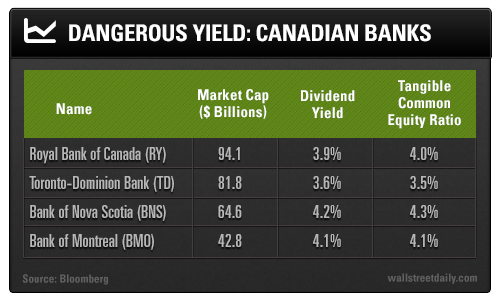On Monday, the Bloomberg Commodity Index fell to a 12-year low.
This is bad news for economies dependent on commodity exports, particularly Canada and Australia.
In fact, the Australian banking system is as unsafe as ever due to the global commodities rout and an overpriced housing market.
In March 2014, I listed six dangerous stocks with tempting yields, including Westpac Banking Corporation (NYSE:WBK), one of Australia’s largest banks.
However, this edition of “dangerous yield” focuses on our neighbors to the north, who are in serious trouble.
According to an analysis of global housing markets conducted by Deutsche Bank AG NA O.N. (NYSE:DB), Canada’s housing market may be the most overpriced in the entire world relative to historical averages of home price/rent and home price/income.
DB’s Chief International Economist, Torsten Slok, and his team warn that Canada’s household debt as a percentage of household income is higher than it’s ever been – higher even than U.S. household debt to income at the apex of the U.S. housing bubble.
Thus, the collapse in the price of oil – which is by far Canada’s top export – couldn’t come at a worse time for the country’s economy and financial institutions.
And as we know, a housing bust-induced recession can be particularly hard on a banking system.
That’s why it’s very troubling that the Canadian banks have relatively low tangible common equity (TCE) ratios, which measure leverage and capital adequacy.

As you can see in the above table, Royal Bank Of Canada (TO:RY), Toronto-Dominion Bank (The) (NYSE:TD), Bank of Nova Scotia (The) (NYSE:BNS) and Bank of Montreal (NYSE:BMO) all have TCE ratios below 5%.
To put that into context, KeyCorp, Regions Financial Corporation (NYSE:RF) and Wells Fargo & Company (NYSE:WFC) have TCE ratios of 10.2%, 9.8%, and 7.6%, respectively. In other words, these U.S. banks are less leveraged and better capitalized than their Canadian counterparts.
If a Canadian recession ushers in a default cycle, the aforementioned Canadian banks may not be able to absorb steep losses in their loan portfolios. To me, the Canadian banks seem uninvestable at this point.
Bottom line: When your housing market is egregiously overpriced, household debt levels are in the stratosphere, the prices for your primary exports are plunging to multi-year lows, and your banks aren’t prepared for the fallout, then you could have a massive problem on your hands.
Speculators who believe the situation in Canada is going to get ugly may even consider buying put spreads on the iShares MSCI Canada (NYSE:EWC).
For example, buying the June 2015 25 strike put option contract and selling the June 2015 20 contract would cost $0.85 (net debit), and have a maximum profit of $4.15.
Safe (and high-yield) investing,
Alan Gula, CFA
